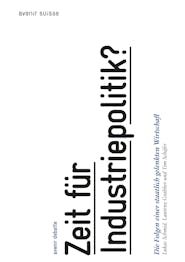Internationally, industrial policy is back in full force. In response to growing geopolitical tensions, climate change or concerns about competitivity, governments around the world are granting subsidies like never before. In 2023, these subsidies amounted to over 1,700 billion US dollars. All backed by a political promise: a strong national industry creates the basis for greater prosperity, an intact environment and enhanced security.
However, can industrial policy guarantee supply security? Can it deal with climate change? And is it necessary to put the Swiss economy on an “equal footing” with the rest of the world? These are the questions addressed by Lukas Schmid, Laurenz Grabher and Tim Schäfer in Avenir Suisse’s latest study “The Return of Industrial Policy?”
Important concerns
Objections regarding the state encouraging major projects and interfering in business decisions are legitimate. If politicians want to identify which companies deserve support or focus on certain technologies, they can rely on far less information than the numerous rival companies. The private sector has by far the best chance of making the right decisions when it comes to identifying markets and future technologies.
Moreover, there is always a risk that public support, whether for future technologies or long-established sectors, will be dominated by the interests of the beneficiaries. As a result, industrial policy is inefficient and runs the risk of putting specific interests before general interests.
Industrial policy is also gaining ground in Switzerland
As explained, Switzerland has two approaches when it comes to its industrial policy. On the one hand, it has so far renounced the promotion of key technologies, which is widespread abroad. On the other hand, in addition to known cases of abusive subsidies such as in the tourism sector, there are currently problematic developments aiming to promote specific branches of industry. One must resist promoting specific interests that arise from this. It is precisely because politics has not prevented structural change in industry since the turn of the millennium that deindustrialization has not occurred in Switzerland.
If industrial policy is to be strengthened in our country, it would be a good idea to take a look at our own past. Switzerland’s economic history is full of misadventures. In the 20th century, price agreements and market partitioning led to decades of higher prices for consumers and crippled the economy’s competitiveness. Moreover, as the study explains in detail, the Swiss Confederation made several miscalculations when promoting future technologies, such as the development of a Swiss nuclear reactor in the 1960s.
Targeting rather than generalizing
Industrial policy primarily helps companies or industries that receive political support, to the detriment of business competitors, consumers, and taxpayers. Once introduced, it is difficult to reverse, as the interests of the beneficiaries can become very powerful. Moreover, such interventions slow down innovation and distort competition. For Lukas Schmid, co-author of the study, it is therefore clear that “For Switzerland, industrial policy is not synonymous with a prosperous future. To be attractive, the quality of the business location and competitiveness depend on the maintenance of the economic framework conditions.”
Industrial policy goals can be reached more efficiently. For climate protection, a more effective measure would be to abolish all fossil fuel subsidies (which currently amount to CHF 260 per resident per year) as well as distorting tax incentives for companies with high-energy consumption (e.g. exemption from CO2 tax). Finally, CO2 emissions should be priced and reimbursed to the population.
To ensure supply security, Switzerland’s current system of compulsory reserves needs to be optimized. Furthermore, the private sector should reduce unilateral dependencies by better distributing value chains. It has already been doing so for some time. There is therefore no need for a race to promote key technologies.






